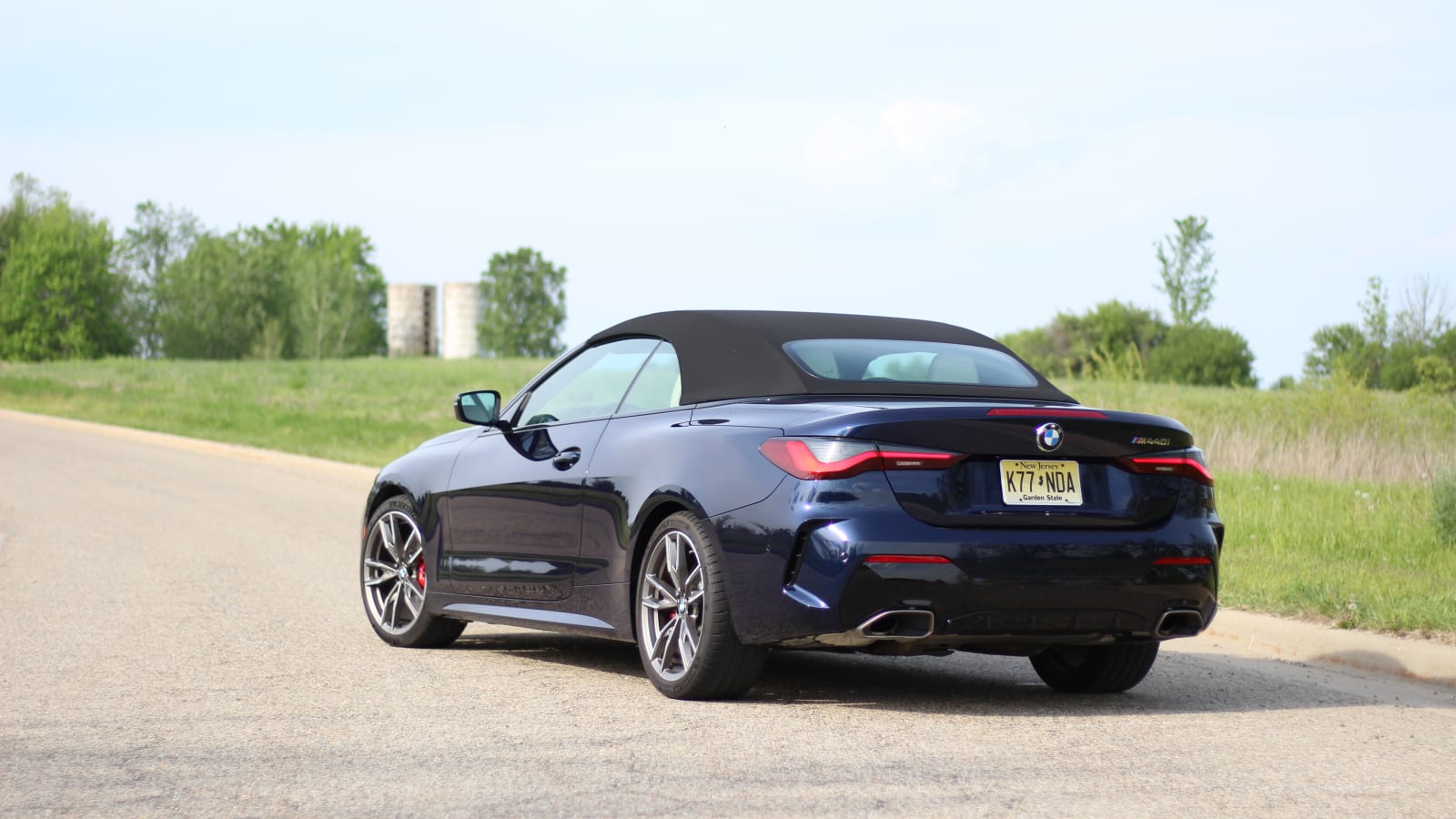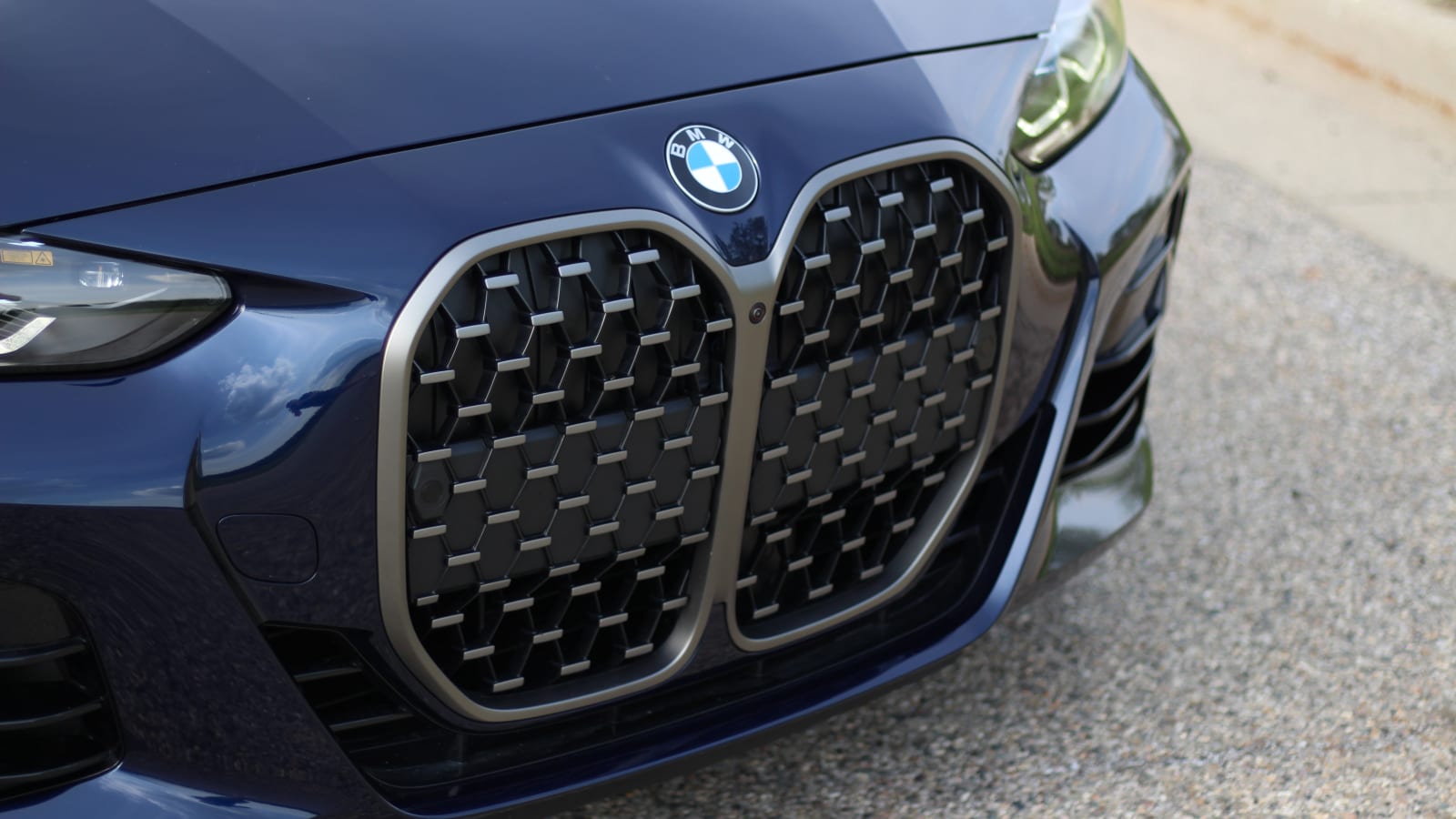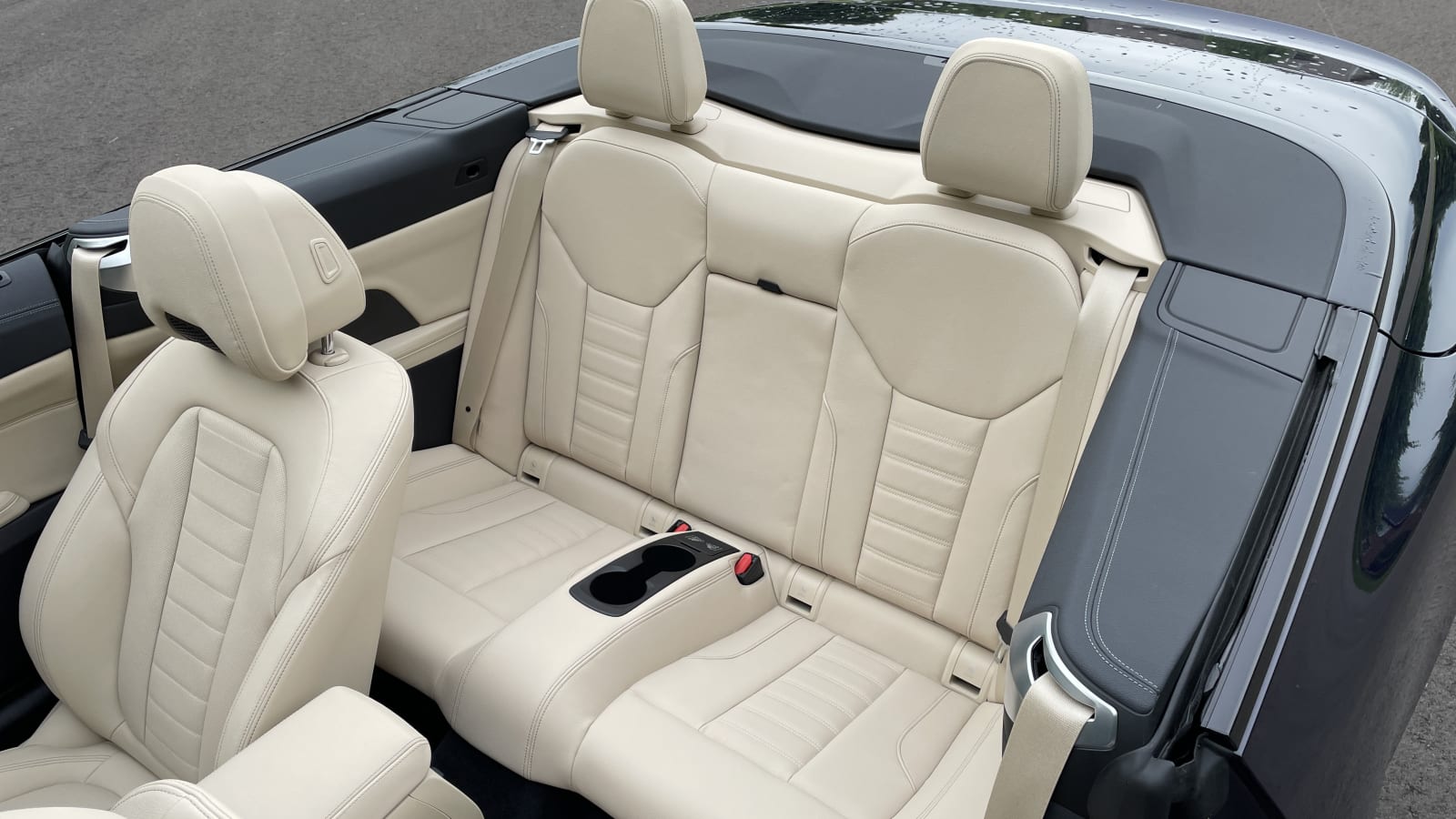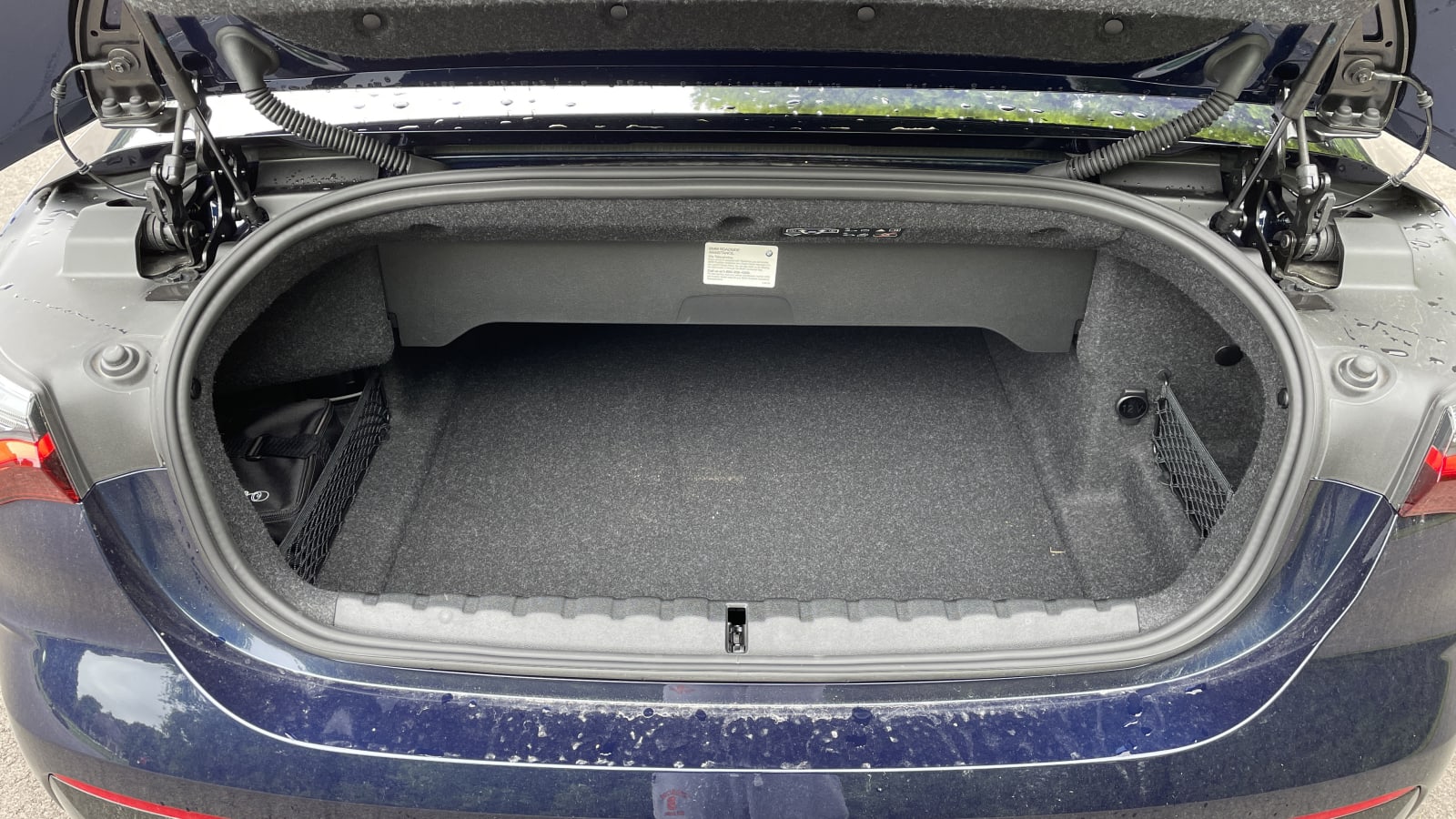The 4 Series is one of BMW’s most versatile models these days, and it’s a name that hasn’t even existed for a decade. There’s the standard Coupe, a Gran Coupe, a Convertible, and in a way, an electric model, too. We’ve already tested various versions of the two-door hardtop Coupe, but now it’s time to give the 2021 4 Series Convertible its time in the sun.
No piece of news is bigger for this generation of 4 Series Convertible than the change from a hardtop to a fabric soft top. The argument for each top remains the same as it always has. A hardtop has the potential to produce less wind noise, provide better cabin insulation and smaller blind spots. Meanwhile, soft tops traditionally weigh far less and take up less space in the trunk when stowed – being less complex almost certainly helps in terms of long-term reliability. You can make a case for the aesthetics of one over the other either way, but when it comes to the 4 Series, we prefer this new car’s soft top.
The top itself is made with multiple layers of insulation to try its best at mimicking the luxuries afforded by a hardtop, while utilizing various means of ensuring it stays as taut as possible. BMW is aiming for a coupe-like appearance when fully enclosed, and the top’s shape does a convincing job. As in past BMW soft tops, there’s a real glass rear window, and the option of a black fabric top that features a metallic shimmer. Our test cars weren’t fitted with this top, but the idea is to make it look more like paint than flat black fabric.
Of course, the advantages of a soft top come along for the ride. BMW says this top is 40% lighter than the old hardtop and offers 0.2 inch more headroom. Cargo capacity increases by 1.2 cubic-feet, but don’t get too excited, because the cargo area is still a rather cubby-like 9.0 cubes (the Coupe’s is 12.0 cu-ft). BMW says all that extra insulation makes for quicker heating of the cabin in cold weather, but we’ll have to take their word on that since we happily tested the car in steamy Michigan in May. Putting the top up or down is a middling 18-second process and can be done at speeds up to 31 mph. You can even control the top via the keyfob to change its position from outside the car.
Just like the standard 4 Series Coupe, the Convertible is offered in both 430i and M440i variants. Although xDrive versions are coming in July, both will be rear-drive-only in the beginning. There’s additional significance within that fact: it means the Convertible offers a rear-wheel-drive M440i. The Coupe version is only all-wheel drive. While it’s logical that all-wheel-drive isn’t a necessity for a convertible, it’s hard to see why it’s obligatory for a luxury sport coupe bound to find its way into innumerable garages in California, Florida, Texas, etc.
Powertrain specs mirror those of the other 4 Series. The base 430i is packing a 2.0-liter turbocharged four-cylinder with 255 horsepower and 295 pound-feet of torque. Then the M440i gets you up to 382 horsepower and 369 pound-feet of torque. Both are plenty quick — the 430i hits 60 mph in 5.9 seconds, and the M440i does it in 5.0 seconds. Expect both of those figures to improve with the all-wheel-drive models, as they lag behind the Coupe’s all-wheel drive times by a wide margin of 0.4 and 0.7 second, respectively. Just like most BMWs these days, both models are equipped with an eight-speed automatic only.
Piloting the M440i with its top down is a sonorous hoot. Despite taking measures to dampen engine noise with the top down — BMW says it added extra sound deadening around the intake, engine cover and underbody to reduce noise — the inline-six is a treat to the ears. The active exhaust can open up and sing some beautiful music when you wring it out past 5,000 and 6,000 rpm. There’s no way you tire of hearing this pretty note crescendo up and down over time. Rolling around with the top down even mitigates the fake noise pumped through the speakers, so you’re mostly hearing the real thing.
You’re bound to frequently hear the tires with this rear-drive model, too. So long as you have it in BMW’s excellent Sport Traction mode, the M440i will leave two strips of rubber on every full throttle takeoff. Feed some lock in, and you’ll soon learn of its expertly dialed-in slip control that lets loose the rear end by just the right amount. Acceleration is noticeably slower than the M340i or M440i xDrive models, but the wind in your hair and extra noise is enough to sate our appetite for accelerative thrills.
The 430i is peppy, but merely middling in thrust considering its near 6-second sprint to 60 mph. BMW’s four-cylinders tend to make better noises than most, but this model is less about loud noises and more about luxury convertible motoring.
Handling is hampered in both models. You can easily tell that the Convertible has lost some of the rigidity and stiffness present in the 3 Series and 4 Series Coupe. Plus, the M440i Convertible weighs 194 pounds more than the Coupe, and that’s comparing the rear-drive soft top to the all-wheel-drive Coupe. We suspect the xDrive variant will gain another significant chunk of weight. Versus the previous generation, the four-cylinder version comes in 47 pounds lighter, and the six-cylinder equivalent is 76 pounds heavier.




Convertible-specific enhancements for this generation of 4 Series include an aluminum sheer panel in front, side skirts with greater torsional rigidity, a stronger transmission tunnel and a rigid rear floor plate — all these combined result in a 4% increase in torsional rigidity versus the old hardtop 4 Series Convertible. Still, there’s no replacing a proper roof.
The drop-top can hold its own when you start pushing, but it’s a less-willing dance partner than the Coupe. Its high-performance Michelin Pilot Sport 4S tires (part of the Dynamic Handling Package that also adds the adaptive dampers and 19-inch wheels) put in overtime to keep grip levels high. There’s less body control even with the adaptive dampers in Sport mode, and the weight of the chassis isn’t hiding anywhere. It’s less sure-footed and confidence-inspiring than the Coupe, as its grand tourer tendencies show.
Similar ink can be spilt about the 430i we drove that was also equipped with the Handling pack. There’s less power to steer with the throttle, but it’s another competent yet unexciting handler. Basically, don’t buy a 4 Series Convertible as your weekend back road warrior. Its capability is undeniable, but the noise the M440i makes is the only thing that truly lights us up from behind the steering wheel.




Spending time on the highway or cruising around town is splendid. Even without the wind deflector in place, wind noise and wind intrusion to the cabin is limited. We tested out just how good BMW’s wind deflection engineering worked with a phone conversation at 75 mph on the highway, and the person on the other line couldn’t even tell we were in a convertible with the top down. Just turn the speaker volume up a few notches, and it’s luxurious sailing. You can even keep the top down when it gets a little chilly at night. Flip on the heated seats, headrest neck warmers and heated steering wheel, and you’ll dramatically increase the temperature range at which top-down driving is tolerable.
Wind noise with the top up is just as stellar, especially considering it’s a rag top. BMW’s insulation strategies work wonders, as the top doesn’t buffet or add much more volume to the interior than what the Coupe already has. You could drive long distances with the top in either position and be totally smitten. Our only complaint about the convertible in sedate driving concerns some extra harshness and vibration around the cowl and A-pillars. Rougher roads and city streets make it obvious that this car is missing a roof and the structural integrity that comes with it. On the plus side of downtown motoring, the car’s new 48-volt mild-hybrid system makes traversing these areas undeniably more peaceful with an engine that switches off as you coast to a stop.
Putting folks in the backseat is a tough game to play. Their faces are smack dab in the heavy wind zone at speed, so long highway trips may require the top to be up. At least the Convertible takes advantage of the Coupe’s much larger rear seat, as an average adult can squeeze behind another average adult without pulling any muscles. That’s rare for a convertible at any price point. Of course, good luck bringing everyone’s baggage along given the small trunk.




The rest of the interior offers up BMW’s typically acceptable amount of luxury with a design that mirrors that of every other 3 and 4 Series. All the usual BMW suspects are present when it comes to available technology, including the iDrive 7 infotainment system that continues to impress and BMW’s full suite of optional driver assistance systems.
And now for the elephant in the room. Or more accurately, the beaver. We somehow made it this far without mentioning the grille, but it’s here to stay for now. Take it or leave it. Does it work any better on the Convertible? No, it doesn’t. One thing’s for sure: Nobody will mistake this 4 Series Convertible for the previous one after a quick glance at the front. Making the new car look new was a worthy goal for BMW to strive for, but most of us on staff still deeply despise this grille – especially since the rest of the car is so genuinely attractive. At least get a darker exterior color if you want to hide that face more effectively. And always approach it from the rear.
A 430i begins at $54,095, while the M440i ramps that right on up to $64,995. The 4 Series doesn’t have the crystal surfaces and general presence of an 8 Series Convertible, but if you were pining after the 840i drop top, the M440i is a compelling “budget” alternative. An Audi A5 or S5 Convertible both start at lower prices, while the Mercedes C-Class Cabriolet equivalents are predictably a bit more expensive. So too is the Mercedes E-Class Cabriolet. All of them drive splendidly at this point, but the BMW is a touch more fun with its lovely inline-six and agile chassis. You either like the looks or don’t by now, but there’s no denying that the car behind the grille is a well-executed and likable convertible.
Associate Editor Byron Hurd also contributed to this review.
Related video:

